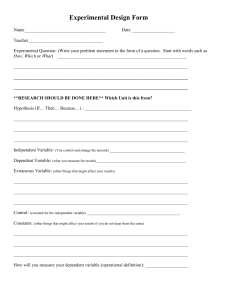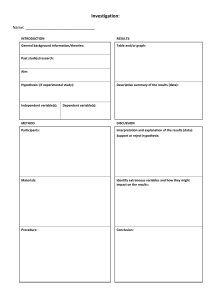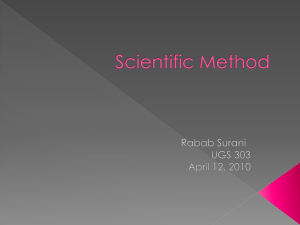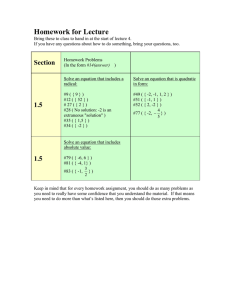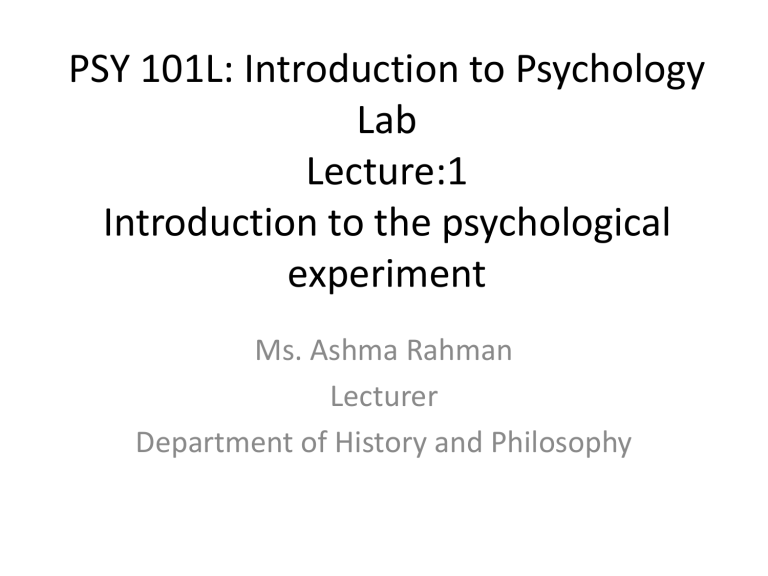
PSY 101L: Introduction to Psychology Lab Lecture:1 Introduction to the psychological experiment Ms. Ashma Rahman Lecturer Department of History and Philosophy Nature of Science Science follows the orderly and consistent method to investigate the natural world around us, gather evidence and adequately explain the evidences. Nature of Science Order & Consistency Natural World Investigation Tentative Evidence Evaluation Explanation “a systematically organized body of knowledge about the universe obtained by the experimentation and observation.” - by McGuigan Psychology as a science Psychology must fulfill the properties of science to qualify as a field of science. 1) It has to be empirical and objective: Testable & free from personal biases. 2) Deterministic: Must follow the causal-effect law. 3) Systematic exploration: Must follow orderly way to investigate and to analyze. 4) Reliability: The investigation result should be consistent under similar circumstances. 5) Predictability: It should attempt to predict for similar events. https://www.youtube.com/watch?v=xzCrc6eRRIk History of Psychology as a Science • Long rooted history in the Greek philosophy • Emergence as a field of science during the 19th century by Wilhelm Wundt in 1879 and by William James in U.S in the next year. • The introduction to experimental methods gave psychology the status of a scientific field of study. Psychology is the scientific study of behavior and mental process. - By Feldman Behavior & Mental Process • Behavior is any kind of activity a living being or an organism that can be observed, recorded and measured. It includes what the organisms do in their space. It even includes the physiological or the bodily changes. E.g. changes in the blood pressure or brain waves. • Types of Behavior A) Voluntary & involuntary behavior B) Overt & covert behavior https://www.youtube.com/watch?v=QSXzzszM93Q • Mental processes are all the things that individuals can do with their mind. It includes thoughts, memories, emotions, motivations, dreams, perception, feelings. • The behavior and mental process are interrelater. One causes the other. Psychologists believe that mental process can be studied by observing changes in behavior. e.g. individual’s level of alertness can be studied by measuring the changes in the electrical signals generated by brain. Or stress can be inferred by measuring changes in the blood pressure and perspiration. Overt Behavior Mental Processes Body Functions ( covert) • • • • • • • • • • • Nervous system (Brain and Body) • Internal functions of the body organs e.g. heart, liver, kidneys • Voluntary, involuntary muscle activities • Genetics How we communicate How we eat How we look Verbal and non-verbal behavior • Expressions, Gesturespostures e.t.c. Thinking Perceiving Memory Learning Problem solving Reasoning HIGHER MENTAL PROCESSCOGNITION Measuring Behavior and Mental process Experimental method and non-experimental method. The key difference between experimental and nonexperimental research lies in the extent to which the environment is controlled and manipulated by the researcher. In experimental studies the researcher sets up the environment and carefully controls the variables of interest and, on the other hand, in non-experimental method, the researcher simply measure variables as they naturally occur. What is Psychological Experiment? The experiment is a well defined, systematic and controlled procedure for identifying the causal relationship between two (or more) variables by: deliberately producing a change in one variable and observing the effects of that change on other variable Variables: Behaviors, events or any other characteristics that can be changed or vary somehow in an experiment is called the variable. e.g. age, gender, sound, light, response etc. Variables are the central core of any experimental research of psychology. In any experiment psychologists establish the causeeffect relationship by manipulating these variables. The causal effect relation is studied by deliberately producing change in one variable to see its effect on the other. e.g. to see the effect of noise on attention. • Independent variable (IV) and • Dependent variable (DV). Independent variable (IV) : The variable that is manipulated in an experiment is called the IV. e.g. the intensity of sound. These are the factors in an experimental setting whose effect defines the outcome of the research. e.g. Researcher may increases and decries the intensity of sound to investigate whether it effects the attention in a classroom. Here the amount of attention depends on the intensity of sound. So the sound here is the IV. Dependent Variable (DV) The variable that is measured and is expected to change as a result of changes caused by the experimenter’s manipulation of the independent variable. It shows the effect of manipulation and change in independent variable. In other words, the variation in the dependent variable depends on the variation in the independent variable. • The result of an experiment is the changed condition of the dependent variables that is produced by the direct effect of the independent variable. Extraneous Variable: Conditions or factors that an experimenter wants to prevent from affecting the outcomes of the experiment. EV are those factors in the research environment which may have an effect on the dependent variable(s) but which are not controlled. Extraneous variables are dangerous. They may damage a study's validity, making it impossible to know whether the effects were caused by the independent or some extraneous factor. e.g. the light effect in a cloth store Hypothesis Testing Hypothesis: a tentative statement about the relationship between two or more variables. A specific, clear, testable prediction about the outcome of the experiment or research ---Example – “sleep-deprived people will perform worse on a test than individuals who are not sleep deprived.” Research Hypothesis A hypothesis derived from an in-depth review of the existing literature or theories. Experimental Manipulation: Experimental manipulation- the change that an experimenter deliberately produces in a situation. Treatment Manipulation implemented by the experimenter Randomization – The procedure which assures that each member of population has equal probability of being selected in the experiment. each level of an extraneous variable has an equal chance to be occurred in all conditions of observation. So that, the extraneous variable does not confound with our manipulated variable Experimental Group A group of subjects (participating in an experiment) are exposed to the treatment (receive non-zero values of the IV) Also called the experimental condition in some situation The group is studied for comparing with the control group Control Group A group of subjects (participating in an experiment) are not exposed to the treatment (receive a zero value of IV). The control group is compared to those of the experimental group on dependent variable Also called the control condition Basic Characteristics of an Experiment Control over extraneous variables holding constant randomizing effects • A causal relationship can be established between the independent and dependent variables by the process of manipulation. • Randomization is done in every step of a psychological experiment. Steps in Experimental Method Steps involved are: 1) Label the experiment: Title must be specific, clear and to indicate the content. 2) Identify Research problem: By definition; a research problem is a statement about an area of concern that needs to be improved or answered. e.g. Whether paracetamol should be banned? • It arises from the gap of knowledge. That is, we may not have enough information about concerned question or the existing knowledge may be disordered. e.g. the lack of knowledge about the side effect of paracetamol leads to the research on whether it should be banned or not? There are time when different studies on the similar topic provides contradictory results, which further create research problems to investigate on. e.g. One study may find that paracetamol is harmful for kidney whereas another could found that it is not. Selection of research problem • Testable & practical • Relevant • True Statement 3) Propose a hypothesis: A clear specific hypothesis needs to be undertaken before conducting an experiment. 4) Identification and control of variable: The independent and dependent variables need to be specified clearly prior to the conduction of the experiment and at the same time all sources of extraneous variables need to controlled. 5) Collection 6)analysis of data 7) Generalize the findings The Ethics of Experiment /Research Protecting Participants as The Aim of The Ethical Guidelines APA (American Psychological Association, 2002) Ethical Guidelines: Assurance that participation is completely voluntary Protect from physical and mental harm Participants’ right to privacy regarding behavior Informing participants about the nature of procedures prior to participation Informed Consent: One of Key Ethical Principles A document signed by participants affirming that they know: the basic outlines of the study what their participation will involve the risks the experiment may hold that their participation is purely voluntary they may terminate the study at any time
